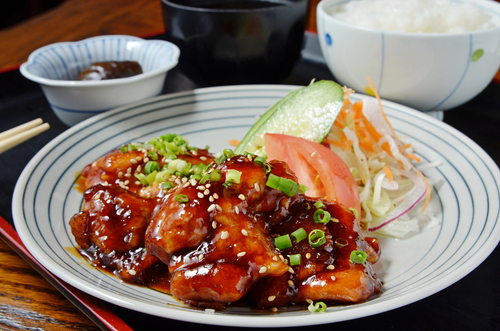Is Teriyaki Sauce Bad For You?
Short answer
Teriyaki sauce, for the most part, is bad for you. While a bit of sauce here and there is unlikely to cause any harm, real problems can arise when teriyaki sauce becomes a dominant part of your diet.
Recommended Alternative
Harmful to your health. A few benefits may be associated, but the bad outweighs the good. Moderation is extremely important.
View Full Grading System
Category 'A'
Very healthy and numerous health benefits. Side effects are rare. Things rated an 'A+' are typically necessary for survival (for example, water).
Very healthy and numerous health benefits. A few harmful qualities may be associated, but only under certain circumstances such as an allergic reaction.
Very healthy and numerous health benefits. Harmful qualities may be associated, but aren't usually serious.
It is important to note that even the best things in life can become bad in immoderate amounts. So, although something may be rated an 'A+', overconsumption/overdoing can bring unwanted effects.
Category 'B'
Very beneficial to your health. Things rated a 'B+' may have a few harmful qualities to pay attention to.
Overall beneficial to your health. Things rated a 'B' may have some harmful qualities to pay attention to.
More beneficial to your health than not. However, harmful qualities are most likely associated and shouldn't be overlooked.
The main difference between category 'A' and category 'B' is the harmful qualities typically present in 'B' items. Serious side effects are usually uncommon, but are still possible and should be taken note of.
Category 'C'
Both beneficial and harmful qualities associated. Things rated a 'C+' are typically a bit more on the beneficial side. Still, moderation is important.
A fairly even ratio of beneficial and harmful qualities. Moderation is important. Very general topics that can lean towards both sides of the spectrum will be placed here as well. Rice, for example, can be good or bad depending on the type.
More harmful than beneficial. Side effects are common, especially when consumed/done excessively. Moderation is very important.
Category 'C' usually denotes to both good and bad qualities. When it comes to this category, it is important to keep this word in mind: moderation.
Category 'D'
Harmful to your health. Although benefits may be associated, the bad most likely outweighs the good. Moderation is very important.
Harmful to your health. A few benefits may be associated, but the bad outweighs the good. Moderation is extremely important.
Harmful to your health. Very few, if any, benefits are present. Things in this category should be avoided as much as possible.
Category 'D' is typically for things that are more harmful than beneficial. While consuming/doing something unhealthy once in a blue moon shouldn't hurt, we definitely recommend eliminating 'D' items as a regular part of your routine/diet.
Category 'F'
Category 'F' is for things that fail to bring anything beneficial to the table, and are very harmful to your health. We recommend completely avoiding anything in this category. Long-term side effects of 'F' items are usually very serious.
Category 'N'
'N' stands for neutral. Things placed into this category are generally (a) neither good nor bad for you, or (b) lack the necessary evidence to reach any conclusions.
Long answer
Teriyaki sauce is a bit difficult to define. First, there’s the fact that “teriyaki” has nothing to do with the sauce or its flavor. Rather, it is a word referring to the process of grilling a food then coating it with a sauce several times. The more proper term for the sauce we know as “teriyaki” would be “tare”. In traditional Japanese cuisine, tare is made from soy sauce, sugar or honey, and sake or mirin (a sake-like rice wine with less alcohol and more sugar). However, the teriyaki sauce most Americans are familiar with comes to us via some extra additions made in Hawaii and include garlic, brown sugar, and fruit juices (commonly pineapple), while leaving out the alcohol.
Overall, teriyaki sauce does not offer many health benefits. It does contain very small amounts of B-vitamins, which are important in converting energy to food, as well as minerals such as iron, magnesium, phosphorus, and potassium. The cost for a small amount of these nutrients (no more than 3% per tablespoon) is a very high amount of sugar and sodium.
Just one tablespoon of teriyaki sauce contains around 690 milligrams of sodium. Excessive amounts of sodium can lead to elevated blood pressure, heart attack, and stroke. Too much sodium has also been found to cause damage to the kidneys and liver. The same amount has around 2 grams of sugar. Sugar increases the risk of obesity, type-2 diabetes, heart disease, and some cancers, as well as other diseases. Furthermore, if you are using teriyaki sauce on something high in cholesterol, like steak, the lack of dietary fiber will do you no favors and cholesterol levels will skyrocket.
Overall, a small amount of teriyaki sauce added to flavor a meal shouldn’t cause any problems, but overdoing it could lead to excessive amounts of sugar and sodium in the bloodstream while delivering very little in terms of nutrition. It should also be mentioned that store-bought varieties are often produced with large amounts of high fructose corn syrup (in many cases, this makes up the majority of the sauce). HFCS, especially over the long-term, can result in a wide array of side effects, including weight gain, type 2 diabetes, increased cholesterol, increased triglyceride levels, and metabolic syndrome.
Possible short-term side effects
- increased blood pressure
-
increased blood sodium
-
increased blood sugar
Possible long-term side effects
- kidney failure
-
liver damage
-
type-2 diabetes
-
cancer
-
heart disease
Ingredients to be aware of
Healthier alternatives
- traditional japanese tare
Our Wellness Pick
(what is this?)
Coconut Aminos Variety Pack
- Soy-free alternative
- Low glycemic index
- Organic ingredients
- Gluten-free sauces
- Versatile flavor enhancers
Learn More!
Please turn your Ad Blocker off to see this content. Thank you!
Thank you for your feedback!
Written by Jeff Volling
Published on: 02-28-2016
Last updated: 12-15-2023
Thank you for your feedback!
Written by Jeff Volling
Published on: 02-28-2016
Last updated: 12-15-2023

 Approved by
Approved by 















